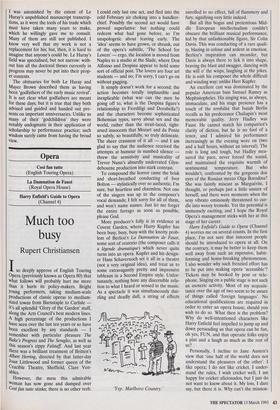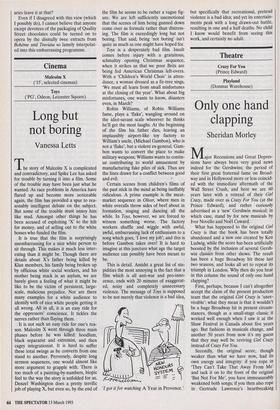Opera
Cosi fan tutte (English Touring Opera) La Damnation de Faust (Royal Opera House) Harry Enfield's Guide to Opera (Channel 4)
Much too busy
Rupert Christiansen
Iso deeply approve of English Touring Opera (previously known as Opera 80) that what follows will probably hurt me more than it hurts its policy-makers. Bright Young performers, taking medium-scale Productions of classic operas to medium- sized towns from Barnstaple to Carlisle it's all splendid 'Glory of the Garden' stuff, along the Arts Council's best modern lines. A high percentage of the productions I have seen over the last ten years or so have been excellent by any standards — I remember with particular pleasure The Rake's Progress and The Seraglio, as well as this season's zippy Falstaff. And last year there was a brilliant treatment of Britten's Albert Herring, directed by that latter-day Joan Littlewood and former queen of the Crucible Theatre, Sheffield, Clare Ven- ables.
However, the mess this admirable Woman has now gone and dumped over Cosi fan tutte stinks; there is no other verb. I could only last one act, and fled into the cold February air choking into a handker- chief. Possibly the second act would have proved superlative: but nothing could redeem what had gone before, so I'm unapologetic about leaving early. The `idea' seems to have grown, or shrunk, out of the opera's subtitle, 'The School for Lovers' — ergo, the location is moved from Naples to a studio at the Slade, where Don Alfonso and Despina appear to hold some sort of official post. The lovers are four art students — and no, I'm sorry, I can't go on without gagging.
It simply doesn't work for a second; the action becomes totally implausible and inexplicable (what war can the men be going off to, what is the Despina figure's relationship to Fiordiligi and Dorabella?) and the characters become sophisticated Bohemian types, savvy about sex and the world, rather than the strait-laced, tight- arsed innocents that Mozart and da Ponte so subtly, so beautifully, so truly delineate. The sheer crassness of it all — and I am glad to say that the audience received the attempts at humour in numbed silence threw the sensitivity and musicality of Trevor Nunn's absurdly underrated Glyn- debourne production into stark contrast. To compound the horror came the brisk and short-breathed conducting of Ivor Bolton — stylistically ever so authentic, I'm sure, but heartless and charmless. Not one of the singers was up to the composer's vocal demands; I felt sorry for all of them, and won't name names. Just let me forget the entire farrago as soon as possible, please God. More producer's folly is in evidence at Covent Garden, where Harry Kupfer has been busy, busy, busy with the knotty prob- lem of Berlioz's La Damnation de Faust, some sort of oratorio (the composer calls it a legende dramatique) which never quite turns into an opera. Kupfer and his design- er Hans Schavernoch set it all in a theatre (not a very original idea), and treat us to some extravagantly pretty and impressive tableaux in a Second Empire style. Unfor- tunately, nothing bore any discernible rela- tion to what I heard or sensed in the music. As a spectacle it was simultaneously daz- zling and deadly dull, a string of effects 'Yep. Marlboro Country.' unrolled to no effect, full of flummery and fury, signifying very little indeed.
But all this bogus and pretentious Mid- dle European intellectualism couldn't obscure the brilliant musical performance, led by that unfashionable figure, Sir Colin Davis. This was conducting of a rare quali- ty, blazing in colour and ardent in emotion. Berlioz's inspiration can meander, but Davis is always there to lick it into shape, braving the blast and swagger, dancing with the will o' the wisps, laughing at the jokes. He is with his composer the whole difficult and winding way; unlike Herr Kupfer.
An excellent cast was dominated by the popular American bass Samuel Ramey as Mephistopheles. His singing was, as always, immaculate, and his stage presence has a touch of the tenibilita that Isaiah Berlin recalls as his predecessor Chaliapin's most memorable quality. Jerry Hadley was Faust. He cannot match his compatriot's clarity of diction, but he is no fool of a tenor, and I admired his performance increasingly as the evening wore on (two and a half hours, without an interval). The role is long and tough, but Hadley mea- sured the pace, never forced the sound, and maintained the requisite warmth of sentimental temperature. But who wouldn't, confronted by the gorgeous doe eyes of the Russian mezzo Olga Borodina? She was faintly miscast as Marguerite, I thought, or perhaps just a little unsure of herself, and there were moments when the sexy vibrato ominously threatened to cur- dle into woozy tremolo. Yet the potential is immensely exciting, and I hope the Royal Opera's management sticks with her at this stage of her career. Harry Enfield's Guide to Opera (Channel 4) worries me on several counts. In the first place, I'm not sure that innocent people should be introduced to opera at all. On the contrary, it may be better to keep them well away from such an expensive, habit- forming and home-breaking phenomenon. I also wonder why such frenzied effort has to be put into making opera 'accessible'? Tickets may be booked by post or tele- phone. Singing on a public stage is not such an esoteric activity. Most of my acquain- tance over the age of two seem to be aware of things called 'foreign languages'. No educational qualifications are required in order to enter an opera house, should you wish to do so. What then is the problem? Why do well-intentioned characters like Harry Enfield feel impelled to jump up and down persuading us that opera can be fun, oh yes, FUN, and that operatic folks enjoy a pint and a laugh as much as the rest of us?
Personally, I incline to Jane Austen's view that 'one half of the world does not understand the pleasures of the other'. I like opera; I do not like cricket. I under- stand the rules, I wish cricket well, I am happy for cricket aficionados, but I just do not want to know about it. My loss, I dare say, but there it is. Why can't the mission- aries leave it at that?
Even if I disagreed with this view (which I possibly do), I cannot believe that anyone except devotees of the packaging of Quality Street chocolates could be turned on to opera by the dismally twee extracts from Boheme and Traviata so lamely interpolat- ed into this embarrassing programme.



























































 Previous page
Previous page